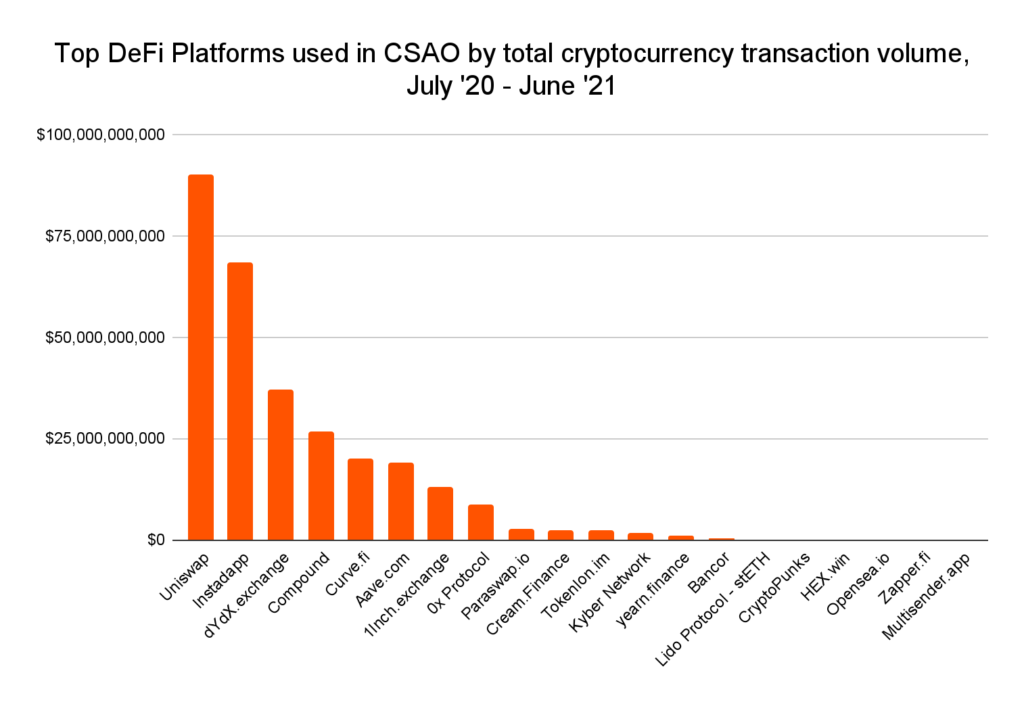Central, South Asia love DeFi so much, crypto volume spiked 700%

Decentralized finance (DeFi) swept Central, Southern Asia, and Oceania (CSAO) over the past year, with wallets controlled by residents across the region receiving 14% ($572.5 billion) of global crypto transfers between July 2020 and June 2021.
The value of those crypto transactions increased 706% during those twelve months, according to Chainalysis. This makes CSAO the fourth largest crypto economy.
In that time, DeFi transactions rose from near-zero to the majority of the region’s crypto activity. Decentralized exchanges UniSwap, InstaDapp, and dYdX were the top three beneficiaries.
Newer exchanges like Compound, Curve, AAVE, and 1inch also experienced significant growth.
Some countries like India have instituted various bans on crypto activities. Nevertheless, India still saw a 641% year-over-year increase in its crypto activity.
DeFi applications accounted for 59% of the transaction volume in the country.

Neighboring Pakistan’s crypto transaction volume rose 711%, with a 33% share for DeFi. Vietnam’s transactions more than quintupled, with 47% of transactions sent to DeFi marketplaces.
Young Asia driven to crypto and DeFi
Young users are driving growth numbers across Central and South Asia, as well as interest in blockchain and decentralization technologies.
But Chainalysis also noted the popularity of gambling in the region (which is mostly illegal), in addition to the lack of low-risk investment vehicles.
Traders and experts in other countries echoed similar sentiments. Investing in crypto — albeit volatile and rife with scams — may be preferable to saving when there are few better options, they said.
“Low financial literacy is a driver of excessive risk-taking and may create lucky financial rewards for crypto investors during a bull market,” Binh Nguyen of Royal Melbourne Institute of Technology-Vietnam told Chainalysis.
“Lots of sophisticated investors may be waiting five to 10 years and missing out.”
India leads high-value crypto transactions in CSAO
Crypto transactions worth at least $10 million accounted for 42% of total transactions in India, 29% in Vietnam, and 28% in Pakistan
India has historically sent mixed signals when discussing the legal status of crypto. Most recently, India has shown interest in taxing crypto rather than banning it altogether.
Crypto companies in India received less than 1% of the $5.5 billion invested in blockchain startups as of May 2021.

Read More: [Europe now world’s number one crypto economy, overtaking East Asia]
However, Indian ventures like Polygon and WazirX have attracted some US investors.
Is DeFi better than banking?
More Central and South Asians want payments in crypto. The convenience, speed, and imperviousness to banking delays make it an attractive option.
Tech-savvy freelancers often work for international employers, and it’s reportedly common to pay freelancers in cryptocurrencies like Bitcoin, Ether, and centralized stablecoins like USDC.
Popular centralized exchanges in the region include international platforms like Binance and KuCoin. Huobi and OKEx in China are also dominant in the area, as well as Singapore-based FTX.
India generally uses WazirX. Decentralized exchanges like Uniswap are popular with individuals who have had difficulty establishing an account on centralized exchanges.
Quantstamp Managing Director Krishna Sriram credits DeFi’s growth to its permissionless nature and the difficulty many Indians face in opening bank accounts.
“Centralized exchanges are becoming more stringent and harder to use for people in certain jurisdictions. DeFi doesn’t discern where you’re from or care if it has a relationship with your bank,” said Sriram (via Chainalysis).
Looking for bite-sized news? We’re on Twitter.
